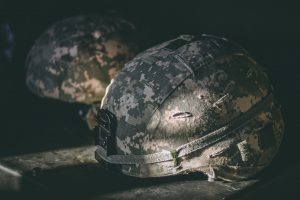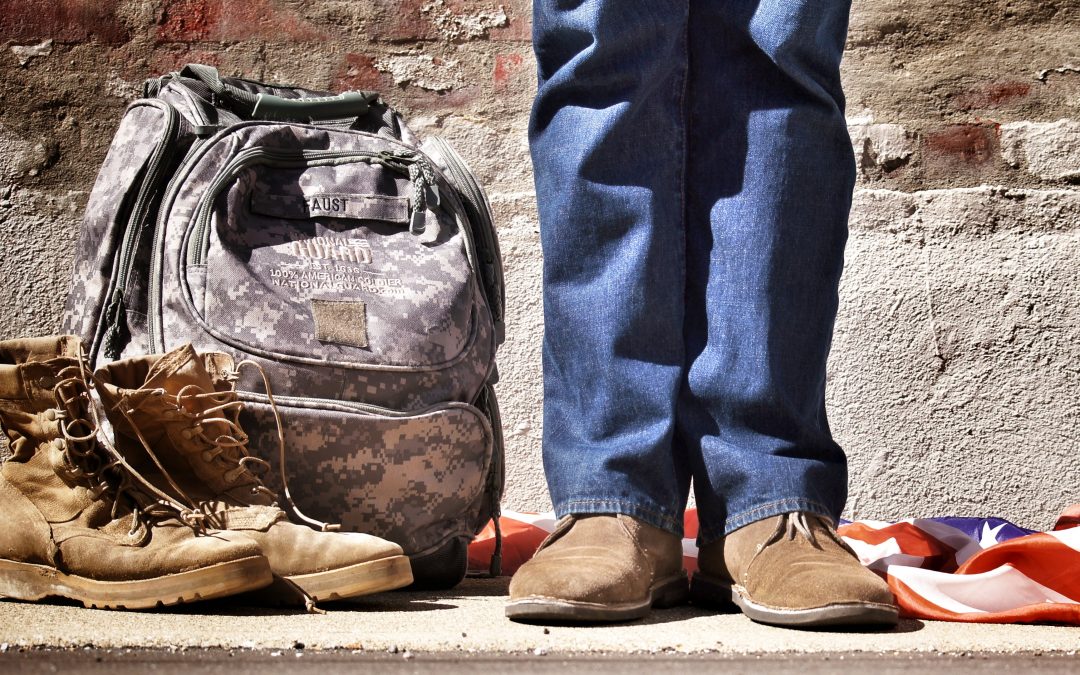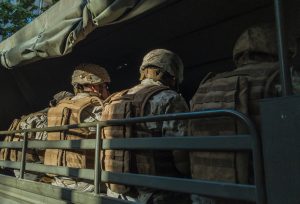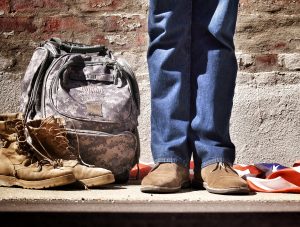Q&A With Former Foster Child Synethia Davis, Who Joined the Military After Aging Forward
* From our “Aging Forward” Series
Interview by Shay Stinson
Edited by Intisar Seraaj
Aging forward is a huge transition in the life of a young adult in foster care. As seen in previous blogs in our Aging Forward Series, there are a lot of decisions that soon-to-be-former foster youth must make. A lot of times, their decision-making process is equipped with very few resources and support. While college may be a traditional choice for most youth entering adulthood, military service can be appealing for those who feel college isn’t the right choice for them, for those ready to move on to a stationary career sooner than college allows, or, in Synethia Davis’ case, feel they need to learn discipline before fully embracing their adult independence. There are many other great reasons to chose military service as a path forward, such as having the military pay for your higher education.
I had a chance to chat with Davis, a former foster child from Birmingham, Alabama who is currently serving as a juvenile probation officer in Georgia. We talked about her foster care experience and her choice to serve in the military as she aged forward from foster care.
SHAY: You said you’re a juvenile probation officer. How long have you been doing that?
SYNETHIA: For about a year. I just moved here last year.
SHAY: And right now you’re active duty personnel?
SYNETHIA: Well, right now, I’m not active duty. I’m in the National Guard.
SHAY: How long have you been in the National Guard?
SYNETHIA: I’ve been in the military for nine years, [this January 2020].
SHAY: Did you leave foster care and go straight into the military?
SYNETHIA: I actually did. Four days after my 21st birthday is when I left for basic training. I aged out of care.
SHAY: Who was your foster parent at the time?
SYNETHIA: I was actually in an ILP (independent living plan) apartment. I could no longer be in a foster home in Birmingham, [Ala.], from what I was told. *Synethia remembers later that her SFH foster parent was Nakishia Cook.
SHAY: Your assigned support team helped you get set up in your independent living apartment?
SYNETHIA: My social worker—I was in a group home first and the group home was called Group Homes for Children. It was an organization that had multiple group homes in Montgomery, [Ala.]. They made me move to Montgomery, [Ala.] at the time, due to some circumstances. They had an ILP program. I asked about it and my social worker put into place where I’d leave the group home when I turned 18 and go to the independent living program, and that’s what the apartments were. I no longer wanted to be in Montgomery, [Ala.] so they transferred me back to Birmingham, [Ala.] to be closer to my social worker, and that’s how I ended up there.
SHAY: If you remember, when did you come into foster care.
SYNETHIA: I was three when I first entered the system.
SHAY: And you came up in the system through Seraaj [Family Homes, Inc.]?
SYNETHIA: No, I don’t know who I was with at that age. But we were actually transitioning with a family friend, I believe, and then we went back with our mom. It was something of that nature. Then, she completely lost us when I was about five or six. We were in a joint [situation] with DHR (Department of Human Resources) and the family friend. But, due to circumstances at the family friend’s home, we were immediately taken away from there from school. Then, we were placed in a foster home, my sister and I. I was 12 when I got with Seraaj (SFH) because I was in the 7th grade.
SHAY: Prior to coming to Seraaj (SFH), as a child, before your mom lost custody, were you active with your mom or your biological family
SYNETHIA: I can’t remember.
SHAY: What about after you were in foster care?
SYNETHIA: No, not at all. Actually, I just met back with them when I was 21 after I got back from my [military] training. I met both my mother and my father. She was in rehab. I met my father first and four of my siblings.
SHAY: How many siblings do you have?
SYNETHIA: It’s nine of us in all. [When I say,] “the two of us,” that’s my sister from my mom. We two were in foster care.
SHAY: Do you still have siblings in foster care now?
SYNETHIA: No, It was just myself and my sister. She’s a year older than me.
SHAY: So you ended up in a Seraaj (SFH) foster home and that was with Ms. Swoopes?
SYNETHIA: Yes, and I had another one. I don’t remember her name. I think I had probably two or three [more SFH foster parents] within a very short amount of time. I left her and went to the Gateway campus. Then, I left there and went to another group home. I was in group homes and in other foster homes and I believe I went back to another Seraaj (SFH) [foster] home.
SHAY: Who were you living with after you aged forward from foster care?
SYNETHIA: When I came back from basic training, I was living with a friend. [Going into my independent living apartment], I was in a foster home—it was an emergency placement—in Birmingham, [Ala.]—well Bessemer, [Ala]. Due to my behavior and people feeling threatened, I wasn’t able to be in a foster home Birmingham, so they moved me to Montgomery to a group home.

Photo by Israel Palacio from Unsplash.
SHAY: Going into the military from foster homes and group homes, was it a shock to you? How’d you adjust?
SYNETHIA: Oh, no, it wasn’t a shock, because some people have never left home. It’s a shock to them. Being around different people from different walks of life and not knowing them, I was used to that because of the group homes and the facilities I was at. Now, the discipline was the hardest, [but] that’s the reason I joined. Having that authority figure over me was the hardest thing ever, in my opinion.
SHAY: Because you’re used to being the authority!
SYNETHIA: Yes, exactly! Man, it was difficult!
SHAY: Did you get in trouble a lot?
SYNETHIA: I definitely got in a lot of trouble a lot because of my mouth. I had to do a lot of exercises because of my mouth.
SHAY: Did you make any friends during basic training?
SYNETHIA: I definitely made some long-lasting relationships. We check up on each other every now and then. I have a few Facebook friends that I met in basic training.
SHAY: What does that mean to you, coming from a background where you didn’t have a lot of people to get attached to? How did that feel like an adult being able to form attachments?
SYNETHIA: Well, I don’t really form attachments, because anybody can leave at any time. I just check up on them and they check up on me every now and then. If they don’t check up on me or if they leave, it wouldn’t bother me.
SHAY: That’s fair. Do you have any connections with your former foster parents?
SYNETHIA: Uh … we talk every now and then on Facebook.
SHAY: Casual connections?
SYNETHIA: Yes. I do have a foster family that I was with the longest and I still communicate with them.
SHAY: Are you and your big sister close?
SYNETHIA: No, we love each other from a distance. That’s because we’re opposites of each other and we argue all the time.
SHAY: So, we’re trying to do a series about the choices youth in foster care have when aging forward out of foster care. The military is an often overlooked choice. What made you make the choice of going in to the military? What drove you to that choice? A need for income? Stability? Was it something that you always wanted to do?
SYNETHIA: I think it was income and I definitely needed the discipline, because I didn’t want to be a statistic. It was just something different. It was mostly discipline, though.
SHAY: That’s amazing that you recognized that you needed that at a young age.
SYNETHIA: Most definitely. I didn’t want to be a statistic and I knew I was headed in that direction.
SHAY: What advice would you give about the military to youth who are getting ready to age forward?
SYNETHIA: I’d tell them to keep their options open. If they ever consider joining the military, look at multiple branches. That’s one thing I did not do. Do your own research and don’t just go off of what one person tells you because somebody can say no and the other person can say yes. Also, they can get college paid for by the military. What I did, when I was in the (National) Guard was I got my college paid for and also the ROTC, which has a scholarship (but I didn’t get that scholarship). The ROTC has a scholarship and you have to sign up for, I think, two or four years in the military, but you become an officer as soon as you graduate. So, I was enlisted first and then I transitioned over to the officer side. I think they should definitely think about something like that if they want to go to school. When I graduated from UAB (the University of Alabama at Birmingham), I was in ROTC, so I graduated, becoming an officer.
SHAY: What was your major at UAB?
SYNETHIA: I was a criminal justice major with a minor in military science.
SHAY: When you were graduating from basic training, did you have any family support to commend you or congratulate you or help you celebrate?
SYNETHIA: Not at all. When it was family day, I actually went with one of my battle buddies—because that’s what we call each other—and her family to the mall because I didn’t have anybody to go with and they felt sorry for me. I ended up doing my own thing to let them have their family time. I didn’t have anybody for my job [graduation], for my basic training graduation, or for either family day.
SHAY: Was anyone at your college graduation?
SYNETHIA: Yes! I was working for Children’s Aid Society of Alabama, at the time, so a few of them came and a few people from State DHR came. So, that made me really happy. And actually, my real mother came. But she came late. I don’t think she saw me walk across the stage, but my foster parents, the ones that I’m close with, they came.
SHAY: I find that almost disgusting that you chose to serve your country and you did not choose to be in foster care and you did not have the support there to celebrate you after you graduated your military training. So, I apologize for that. That’s a memory you just can’t get past.
SYNETHIA: Stuff like that just makes me stronger as an individual. Of course, it affects some [of my] emotions but I try to think of the positive side of it.
SHAY: Tell me, how was your independent living experience in the apartment? Did you feel like you handled things well?
SYNETHIA: I definitely didn’t handle things well. When I was in Montgomery, [Ala.], it was more structure and it was stricter in those apartments. Each month, you had to pay more percentage of the rent. I ended up having to be admitted to the hospital for surgery and I couldn’t work. So, I was struggling to pay that rent. When I left there and moved to an independent living apartment in Birmingham, [Ala.], I didn’t have to pay for anything. So, you know, I was a free bird and I was not being …
SHAY: You weren’t being responsible?
SYNETHIA: Not at all.
SHAY: That’s good you were able to pull yourself back in before things got completely “out-of-hand.” The last thing I’m going to ask you is about the term “aging out.” What do you think about changing that term to “aging forward?”
SYNETHIA: Oh, I love that! It gives me some type of hope, because “aging out” is scary. The first thing you think of is being scared.
SHAY: I understand that! Looking back on your adolescence, now at the end of your twenties, how do you think you have turned things around for yourself? How was your experience aging forward, so far?
SYNETHIA: At first, it was a struggle—like a bad struggle. I was almost a statistic but I didn’t show it on the outside. Now, it’s going wonderfully. It changed “slowly but surely.” I’m not where I want to be, but I’m fine right now.
SHAY: Do you find yourself giving advice to your juvenile clients about the path that you lived and how you had to straighten yourself up? Do you find yourself kind of mentoring them?
SYNETHIA: Most definitely. I don’t tell them everything. A lot of them don’t know the struggles I’ve gone through. It depends on who it is and what their situation is. I may mention it. Honestly, that’s one of the reasons I got the job because I can relate to some of them and their hardships.
SHAY: Thank you for sharing. Do you have anything else you’d like to add?
SYNETHIA: No, not right now.
SHAY: Could you ever see yourself being an adoptive or a foster parent?
SYNETHIA: Most definitely! I would love to be a foster parent, actually!
After concluding the interview, Davis asked me to see if Abdul Seraaj, the CEO of SFH, remembered her and to say “hi” for her. I asked her to tell me something about an interaction they had to make sure he remembered her. Davis said he should remember her because of her attendance at various company banquets and that she knew his sister Barbara Stinson. I told her I could believe that because Barbara is my mother. We laughed as she reminisced that my mom was the only one who could keep her calm at the group home. Davis said she’ll be visiting Mobile, Ala. soon and would love to reconnect with my mom, and we’re delighted to have her visit soon.
This interview provided remarkable insight in to her choice for military service as she aged forward from foster care. I found so much strength in her responses, even as she recalled a lack of support. We forget easily that foster children do not make the choice to enter care and so we must maintain compassion at all times. Though some may experience the lack of support at pivotal moments, much like Davis did during her graduations, many foster children learn to be resilient and desire to create a positive path for themselves. A career in military service is a viable choice for youth in foster care who are inclined to serve their countries, and we salute them wholeheartedly!




